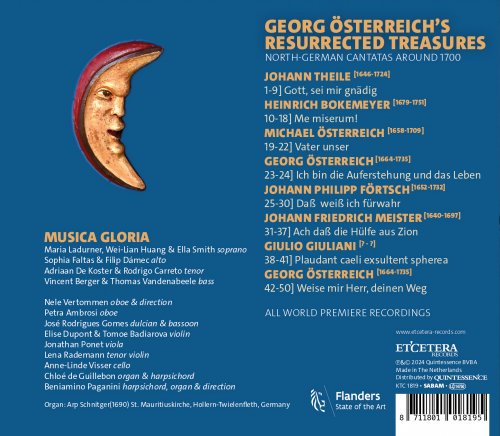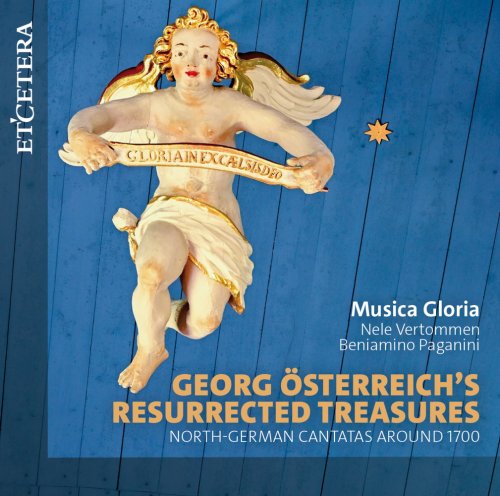
Musica Gloria, Beniamino Paganini & Nele Vertommen - Georg Österreich's Resurrected Treasures (2025) Hi-Res
BAND/ARTIST: Musica Gloria, Beniamino Paganini, Nele Vertommen
- Title: Musica Gloria, Beniamino Paganini & Nele Vertommen - Georg Österreich's Resurrected Treasures (2025) Hi-Res
- Year Of Release: 2025
- Label: Etcetera
- Genre: Classical
- Quality: FLAC (tracks) / FLAC 24 Bit (44,1 KHz / tracks)
- Total Time: 79:05 min
- Total Size: 673 MB / 1 GB
- WebSite: Album Preview

Tracklist:
01. Gott sei mir gnädig: I. Sinfonia
02. Gott sei mir gnädig: II. Tutti - Gott sei mir gnädig
03. Gott sei mir gnädig: III. Canto Solo - Wasche mich wohl
04. Gott sei mir gnädig: IV. Tutti - An dir allein
05. Gott sei mir gnädig: V. Basso Solo - Siehe ich bin aus sündigen
06. Gott sei mir gnädig: VI. Tenor Solo - Entsündige mich
07. Gott sei mir gnädig: VII. Tutti - Verbirge dein Antlitz
08. Gott sei mir gnädig: VIII. Alto Solo - Schaffe in mir, Gott
09. Gott sei mir gnädig: IX. Tutti - Tröste mich wieder
10. Me miserum!: I. Aria - Me miserum!
11. Me miserum!: II. Recit - Turbabor
12. Me miserum!: III. Aria - Jesu Christe
13. Me miserum!: IV. Recit - Ut dirus peccatorum anguis
14. Me miserum!: V. Aria - Sim turbatus
15. Me miserum!: VI. Recit - Peccatum Deum
16. Me miserum!: VII. Aria - Una guttula cruoris
17. Me miserum!: VIII. Recit - Mi Jesu, tibi felix anima
18. Me miserum!: IX. Aria - Jesus esto vitae scopus
19. Vater unser: I. Sonata
20. Vater unser: II. Tutti & Soli - Vater unser
21. Vater unser: III. Trio & Alto Solo - Und führe uns nicht
22. Vater unser: IV. Tutti - Denn dein ist das Reich
23. Ich bin die Auferstehung: I. Sinfonia & Tutti - Ich bin die Auferstehung
24. Ich bin die Auferstehung: II. Duetto & Tutti - Wer an mich gläubet
25. Das weiß ich fürwahr: I. Sinfonia & Tutti - Das weiß ich fürwahr
26. Das weiß ich fürwahr: II. Ritornello
27. Das weiß ich fürwahr: III. Canto II Solo - Wohl an mein Gott & Ritornello
28. Das weiß ich fürwahr: IV. Basso Solo - Doch wehret ab & Ritornello
29. Das weiß ich fürwahr: V. Canto I Solo - Entgehet mir gleich & Ritornello
30. Das weiß ich fürwahr: VI. Tutti Da Capo - Das weiß ich fürwahr
31. Ach daß die Hülfe aus Zion: I. Sinfonia &Tutti - Ach daß die Hülfe
32. Ach daß die Hülfe aus Zion: II. Ritornello
33. Ach daß die Hülfe aus Zion: III. Tenor I Aria - Freue dich : Tutti - Durch die Welt
34. Ach daß die Hülfe aus Zion: IV. Ritornello
35. Ach daß die Hülfe aus Zion: V. Tenor II Aria - Die geneigten Himmel : Tutti - Durch die Welt
36. Ach daß die Hülfe aus Zion: VI. Ritornello
37. Ach daß die Hülfe aus Zion: VII. Tutti Hör, o Herr : Durch die Welt
38. Plaudant coeli: I. Aria - Plaudant coeli
39. Plaudant coeli: II. Recit - O Jesu, supreme
40. Plaudant coeli: III. Aria - Tu universi es vera lux
41. Plaudant coeli: IV. Aria - Alleluja
42. Weise mir Herr, deinen Weg: I. Sinfonia, Andante ma non presto
43. Weise mir Herr, deinen Weg: II. Solo & Tutti - Weise mir Herr, deinen Weg
44. Weise mir Herr, deinen Weg: III. Tenor Arioso - Ich danke dir, Herr
45. Weise mir Herr, deinen Weg: IV. Basso Solo - Denn deine Güte
46. Weise mir Herr, deinen Weg: V. Tutti - Gott es setzen sich Stolzen
47. Weise mir Herr, deinen Weg: VI. Trio - Du aber, Herr, mein Gott
48. Weise mir Herr, deinen Weg: VII. Tenor Solo - Wende dich zu mir
49. Weise mir Herr, deinen Weg: VIII. Tenor Recit & Aria - Thue ein Zeichen
50. Weise mir Herr, deinen Weg: IX. Tutti - Daß du mir beistehest
In this recording Musica Gloria performs forgotten treasures from the manuscript collection of Georg Osterreich (1664-1735).
This collection, better known under the name of his successor Bokemeyer, is one of the most important sources for German sacred music around 1700, being the only source for some of the output from Buxtehude, Bruhns, Rosenmuller and many others. Osterreich started this collection with north German cantatas by himself and by colleagues important to him. Besides two works by Georg Osterreich, his brother Michael, his composition teacher Johann Theile, his singing teacher and colleague giulio Giuliani, his predecessor as Kappelmeister in Gottorf Johann Pilipp Fortsch, his colleague Johann Friedrich Meister and his student and successor Heinrich Bokemeyer, are each represented by one work in this programme.
This recording represents the rich variety of textures and compositional styles found in the music by Osterreich and his circle. From cantatas for a solo voice or a four-part voice group (with and without ripieni) to more unusual settings like two sopranos, alto and tenor (without bass) and a seven-part piece. The instrumental forces asked for are remarkably rich: two oboes, dulcian/bassoon, a five-part string group, harpsichord and organ. Osterreich was a pioneer in the use of oboes in German sacred music in the 1680s.
Musica Gloria researched these performance traditions and performed this repertoire in Hollern (DE) with an original 1690 chuch organ by Arp Schnitger (the main organ builder of that time and area).
This collection, better known under the name of his successor Bokemeyer, is one of the most important sources for German sacred music around 1700, being the only source for some of the output from Buxtehude, Bruhns, Rosenmuller and many others. Osterreich started this collection with north German cantatas by himself and by colleagues important to him. Besides two works by Georg Osterreich, his brother Michael, his composition teacher Johann Theile, his singing teacher and colleague giulio Giuliani, his predecessor as Kappelmeister in Gottorf Johann Pilipp Fortsch, his colleague Johann Friedrich Meister and his student and successor Heinrich Bokemeyer, are each represented by one work in this programme.
This recording represents the rich variety of textures and compositional styles found in the music by Osterreich and his circle. From cantatas for a solo voice or a four-part voice group (with and without ripieni) to more unusual settings like two sopranos, alto and tenor (without bass) and a seven-part piece. The instrumental forces asked for are remarkably rich: two oboes, dulcian/bassoon, a five-part string group, harpsichord and organ. Osterreich was a pioneer in the use of oboes in German sacred music in the 1680s.
Musica Gloria researched these performance traditions and performed this repertoire in Hollern (DE) with an original 1690 chuch organ by Arp Schnitger (the main organ builder of that time and area).
| Classical | FLAC / APE | HD & Vinyl
As a ISRA.CLOUD's PREMIUM member you will have the following benefits:
- Unlimited high speed downloads
- Download directly without waiting time
- Unlimited parallel downloads
- Support for download accelerators
- No advertising
- Resume broken downloads


